关于中国南北方文化差异的英文翻译
- 格式:doc
- 大小:40.00 KB
- 文档页数:4
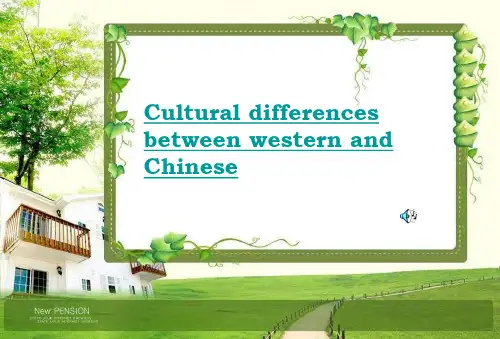
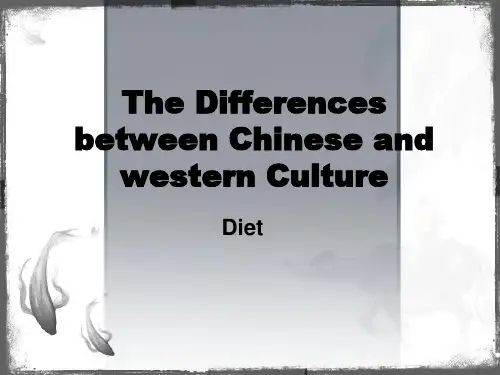
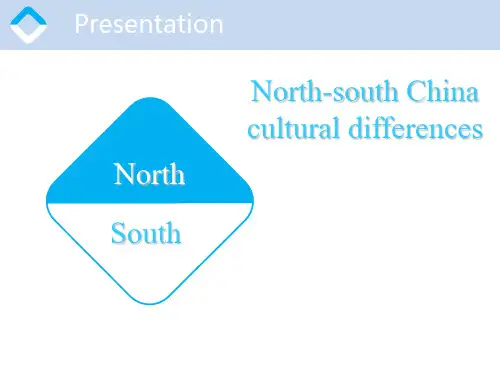
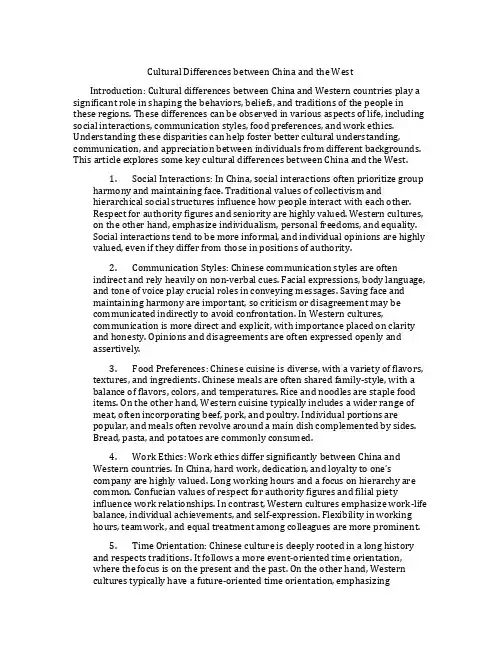
Cultural Differences between China and the WestIntroduction: Cultural differences between China and Western countries play a significant role in shaping the behaviors, beliefs, and traditions of the people in these regions. These differences can be observed in various aspects of life, including social interactions, communication styles, food preferences, and work ethics. Understanding these disparities can help foster better cultural understanding, communication, and appreciation between individuals from different backgrounds. This article explores some key cultural differences between China and the West.1.Social Interactions: In China, social interactions often prioritize groupharmony and maintaining face. Traditional values of collectivism andhierarchical social structures influence how people interact with each other.Respect for authority figures and seniority are highly valued. Western cultures, on the other hand, emphasize individualism, personal freedoms, and equality.Social interactions tend to be more informal, and individual opinions are highly valued, even if they differ from those in positions of authority.munication Styles: Chinese communication styles are oftenindirect and rely heavily on non-verbal cues. Facial expressions, body language, and tone of voice play crucial roles in conveying messages. Saving face andmaintaining harmony are important, so criticism or disagreement may becommunicated indirectly to avoid confrontation. In Western cultures,communication is more direct and explicit, with importance placed on clarity and honesty. Opinions and disagreements are often expressed openly andassertively.3.Food Preferences: Chinese cuisine is diverse, with a variety of flavors,textures, and ingredients. Chinese meals are often shared family-style, with a balance of flavors, colors, and temperatures. Rice and noodles are staple food items. On the other hand, Western cuisine typically includes a wider range of meat, often incorporating beef, pork, and poultry. Individual portions arepopular, and meals often revolve around a main dish complemented by sides.Bread, pasta, and potatoes are commonly consumed.4.Work Ethics: Work ethics differ significantly between China andWestern countries. In China, hard work, dedication, and loyalty to one’scompany are highly valued. Long working hours and a focus on hierarchy are common. Confucian values of respect for authority figures and filial pietyinfluence work relationships. In contrast, Western cultures emphasize work-life balance, individual achievements, and self-expression. Flexibility in working hours, teamwork, and equal treatment among colleagues are more prominent.5.Time Orientation: Chinese culture is deeply rooted in a long historyand respects traditions. It follows a more event-oriented time orientation,where the focus is on the present and the past. On the other hand, Westerncultures typically have a future-oriented time orientation, emphasizingplanning, progress, and achieving goals. Time is seen as a valuable resource to be managed efficiently.Conclusion: Cultural differences between China and the West manifest in various aspects of life, including social interactions, communication styles, food preferences, work ethics, and time orientation. Recognizing and appreciating these disparities can help individuals from different backgrounds develop better cross-cultural understanding and collaboration. By fostering cultural sensitivity and embracing diversity, we can build bridges between cultures and promote harmony in an increasingly interconnected world.。
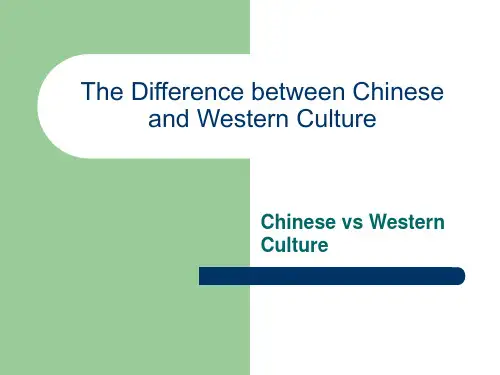
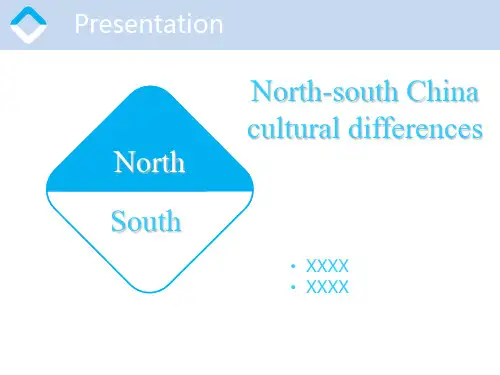
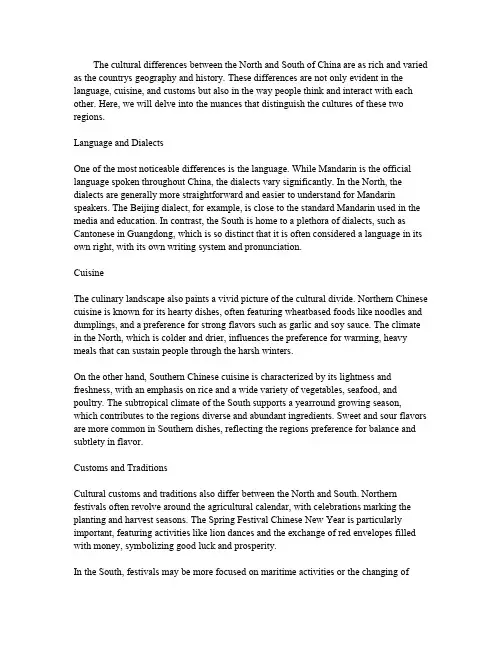
The cultural differences between the North and South of China are as rich and varied as the countrys geography and history.These differences are not only evident in the language,cuisine,and customs but also in the way people think and interact with each other.Here,we will delve into the nuances that distinguish the cultures of these two regions.Language and DialectsOne of the most noticeable differences is the language.While Mandarin is the official language spoken throughout China,the dialects vary significantly.In the North,the dialects are generally more straightforward and easier to understand for Mandarin speakers.The Beijing dialect,for example,is close to the standard Mandarin used in the media and education.In contrast,the South is home to a plethora of dialects,such as Cantonese in Guangdong,which is so distinct that it is often considered a language in its own right,with its own writing system and pronunciation.CuisineThe culinary landscape also paints a vivid picture of the cultural divide.Northern Chinese cuisine is known for its hearty dishes,often featuring wheatbased foods like noodles and dumplings,and a preference for strong flavors such as garlic and soy sauce.The climate in the North,which is colder and drier,influences the preference for warming,heavy meals that can sustain people through the harsh winters.On the other hand,Southern Chinese cuisine is characterized by its lightness and freshness,with an emphasis on rice and a wide variety of vegetables,seafood,and poultry.The subtropical climate of the South supports a yearround growing season, which contributes to the regions diverse and abundant ingredients.Sweet and sour flavors are more common in Southern dishes,reflecting the regions preference for balance and subtlety in flavor.Customs and TraditionsCultural customs and traditions also differ between the North and South.Northern festivals often revolve around the agricultural calendar,with celebrations marking the planting and harvest seasons.The Spring Festival Chinese New Year is particularly important,featuring activities like lion dances and the exchange of red envelopes filled with money,symbolizing good luck and prosperity.In the South,festivals may be more focused on maritime activities or the changing ofseasons.The Dragon Boat Festival,for example,is a significant event in many Southern regions,featuring dragon boat races and the eating of zongzi sticky rice dumplings.The MidAutumn Festival,celebrated throughout China,is also marked by the eating of mooncakes,but the styles and fillings of these pastries can vary widely between the North and South.Social InteractionsSocial interactions are another area where the cultural divide is evident.Northerners are often perceived as more direct and straightforward in their communication,which can be seen as a reflection of the regions historical emphasis on martial values and the influence of the imperial court.In contrast,Southerners are often characterized as more reserved and polite,with a greater emphasis on harmony and consensus in social situations. Economic Development and UrbanizationThe economic development and urbanization patterns also contribute to the cultural differences.The North has historically been the center of political power and heavy industry,which has influenced the regions culture and values.The South,with its proximity to the sea and access to international trade routes,has developed a more commercial and entrepreneurial spirit,which is reflected in the regions vibrant business culture and innovative industries.In conclusion,the cultural differences between the North and South of China are a testament to the countrys rich tapestry of history and regional diversity.Understanding these differences can provide valuable insights into the Chinese way of life and the myriad ways in which culture shapes identity and interaction.Whether its through language,cuisine,customs,or social norms,the contrast between the North and South offers a fascinating glimpse into the complexities of Chinese society.。
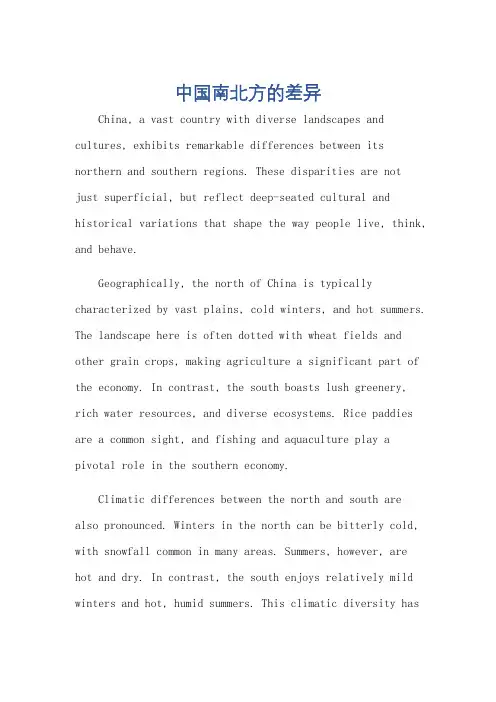
中国南北方的差异China, a vast country with diverse landscapes and cultures, exhibits remarkable differences between its northern and southern regions. These disparities are notjust superficial, but reflect deep-seated cultural and historical variations that shape the way people live, think, and behave.Geographically, the north of China is typically characterized by vast plains, cold winters, and hot summers. The landscape here is often dotted with wheat fields and other grain crops, making agriculture a significant part of the economy. In contrast, the south boasts lush greenery, rich water resources, and diverse ecosystems. Rice paddies are a common sight, and fishing and aquaculture play a pivotal role in the southern economy.Climatic differences between the north and south arealso pronounced. Winters in the north can be bitterly cold, with snowfall common in many areas. Summers, however, arehot and dry. In contrast, the south enjoys relatively mild winters and hot, humid summers. This climatic diversity hasa significant impact on the clothing and lifestyles of people living in these regions.Cultural differences are perhaps the most fascinating aspect of the north-south divide. The north is often associated with a more traditional, conservative culture, with strong family values and a respect for hierarchy. People in the north tend to be straightforward andforthright in their communication, reflecting a culture of honesty and directness. On the other hand, the south is known for its openness and innovation. Southerners often value individualism and creativity, and their culture is rich in art, music, and literature.Dietary preferences also vary significantly between the north and south. Northern cuisine typically features hearty dishes like dumplings, noodles, and roasted meats, reflecting the region's agricultural heritage. Southern cuisine, on the other hand, is renowned for its delicate flavors and intricate cooking techniques. Rice is a staple in southern meals, and dishes often incorporate a wide variety of fresh vegetables, seafood, and spices.Language differences are another notable aspect of the north-south divide. While Mandarin is the official language of China and widely spoken throughout the country, regional dialects vary significantly. Northern dialects tend to be more guttural and direct, while southern dialects are often softer and more melodic. These linguistic differences can sometimes lead to misunderstandings or miscommunications between northerners and southerners.In conclusion, the differences between China's northern and southern regions are vast and multifaceted. From geographical and climatic variations to cultural anddietary preferences, these disparities provide afascinating glimpse into the rich tapestry of Chinese culture. Understanding and appreciating these differencesis crucial for promoting unity and harmony within this diverse country.**中国南北方的差异**中国,一个幅员辽阔、风景与文化多样的国家,其南北地区之间展现出显著的差异。
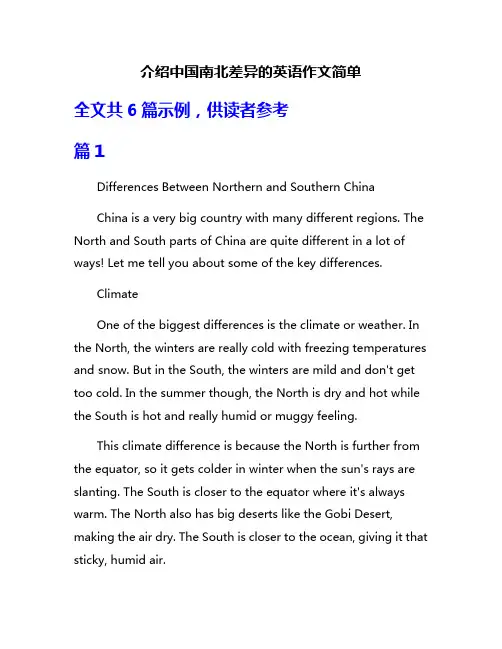
介绍中国南北差异的英语作文简单全文共6篇示例,供读者参考篇1Differences Between Northern and Southern ChinaChina is a very big country with many different regions. The North and South parts of China are quite different in a lot of ways! Let me tell you about some of the key differences.ClimateOne of the biggest differences is the climate or weather. In the North, the winters are really cold with freezing temperatures and snow. But in the South, the winters are mild and don't get too cold. In the summer though, the North is dry and hot while the South is hot and really humid or muggy feeling.This climate difference is because the North is further from the equator, so it gets colder in winter when the sun's rays are slanting. The South is closer to the equator where it's always warm. The North also has big deserts like the Gobi Desert, making the air dry. The South is closer to the ocean, giving it that sticky, humid air.FoodSince the climates are so different, the food is quite different too! In the North, they eat a lot of noodles, dumplings, breads, and wheat products because it's easy to grow wheat in the dry northern climate. In the South with its wet, humid climate, they grow a lot of rice instead. So southern Chinese cuisine uses a lot more rice, along with fresh vegetables and seafood from the ocean.Some famous northern dishes are hot dry noodles from Wuhan, Beijing duck, and dumplings. In the South, you'll find Cantonese dim sum, crispy Peking duck, sweet and sour pork, and lots of stir-fried veggie and rice dishes.LanguageAnother big difference is the language and accents. People in the North tend to speak the Beijing dialect of Mandarin which has a flatter, more straightforward accent. But in the South, there are a lot of other dialects and accents used like Cantonese and the Shanghainese dialect.Cantonese from Guangdong province sounds very different from Mandarin, almost like a different language! And the Shanghai accent puts a twisty, sing-songy tone on their words.Because of this, sometimes northerners and southerners have a hard time understanding each other's accents and dialects.CultureThe culture and customs are also a bit different between North and South China. In the North, the culture is considered more conservative, traditional, and formal. Their values emphasize hierarchy, conformity, and being part of a collective group.But in the South, the culture is more open, creative, and relaxed. Southern Chinese are seen as being more individualistic, open to new ideas, and focused on business and trade because of all the port cities.For example, in the North people value humility and don't like to show off their wealth and success too much. But in the luxurious southern cities like Hong Kong and Guangzhou, people are more open about flaunting their nice clothes, cars, jewelry, and living large.PersonalitiesFinally, the personalities and ways of being are often stereotyped as different too. Northern Chinese are sometimesseen as being more serious, straightforward, and assertive in how they communicate. They tend to speak quite directly.Meanwhile, southerners are viewed as being more laid-back, clever with words, outgoing, and focused on socializing. They have a reputation for being business-savvy too, because of all the trade and business happening in southern port cities.Of course, these are stereotypes and generalizations. Not every northerner is blunt and serious, and not every southerner is smooth-talking! But those are some of the typical differences people perceive.So in many ways - the climate, food, language, culture, and personalities - the North and South of China can feel quite distinct and different from each other, despite being part of the same giant country. Learning about these differences helps us understand and appreciate the diversity within China's borders. No matter if you're northern or southern Chinese though, you're all part of this amazing civilization!篇2The Big Differences Between Northern and Southern ChinaHi everyone! My name is Xiaoming and I'm going to tell you about the big differences between the north and south parts of China. China is a really big country, and even though everyone is Chinese, people in the north and south are quite different in some ways. It's kind of like how kids in your class may have different favorite foods, hobbies, or ways of speaking. Let me explain the main differences I've noticed.The WeatherOne of the biggest differences is the weather. In the north, the winters are freezing cold with tons of snow and ice. But in the south, it hardly ever snows and the winters feel more like fall weather. My cousins who live in Beijing have to bundle up in huge puffy coats, scarves, and boots when going outside in January and February. Meanwhile, my other cousins in Guangzhou might just wear a light jacket!In the summer, it flips around. The north can be dry and hot, but pretty pleasant. The south though gets super duper hot and humid. Imagine going outside and feeling like you're swimming through a big warm soup! That's why so many southern homes and buildings have air conditioning. I've heard some really spicy foods also originated in the south to help people sweat out that intense humidity.The FoodSpeaking of food, that's another major difference between north and south. In the north, they eat a lot of foods like noodles, dumplings, steamed buns, and pancakes. The flavors are simpler, with lots of soy sauce, vinegar, garlic and onions. My dad's favorite dish from his childhood in Beijing is zhajiangmian, which are thick hand-pulled noodles covered in a savory pork and fermented soybean sauce.Down south, the cuisine uses more rice, seafood, and lots of fresh fruits and veggies. The cooking styles are more complex too, with many different spices and sauces. My grandma makes this chicken dish from her village in Guangdong that has about twenty different ingredients like dried shrimp, salted fish, mushrooms, and chilies. It smells amazing but my northern dad can barely handle how spicy and flavorful it is! Rice is a staple in the south, while northerners are more likely to eat foods made with wheat like breads and noodles.Languages and CultureAnother cool difference is that some people in the south speak regional languages or dialects that are quite different from Mandarin Chinese. Like in Guangdong province, many locals speak Cantonese. It sounds totally different from Mandarin,almost like a different language! My grandparents can understand a bit of it, but not fluently. My mom had to take special classes to learn Cantonese when she married my dad so she could talk to his parents. Other regions have their own dialects too like Shanghainese, Fujianese, and Hakka. Up north though, basically everyone speaks standard Mandarin.The cultures in north and south China also have some fascinating differences that go back many centuries. For example, southern styles of architecture, art, music and religion were influenced more by traveling traders, scholars and Buddhist monks passing through from India and Southeast Asia. The famous Shaolin kung fu originated in a Buddhist monastery in Henan province. But in the north, the culture was shaped more by nomads, conquerers and ethnic groups migrating in from Mongolia, Central Asia and Siberia.One unique southern tradition I think is really cool is Chingming Festival where families visit and tend to the gravesites of their ancestors. It's a time to remember the past, clear weeds, leave offerings of food, and connect with heritage. In the north, this custom isn't as widely practiced. But northerners might have different traditions related to things like harvests, winter solstice, or full moons instead.PersonalitiesEven people's personalities can be a bit different between north and south from what I've seen. I've noticed people from Beijing or up north tend to be more direct, blunt and loud. Like if I ask my uncle from Harbin if I look silly, he'll flatout say "Yes, you look totally ridiculous!" But if I ask my aunt from Guangzhou, she'll put it more gently like "Well...that outfit is certainly very unique and bold on you!" The southern people I've met also seem a bit more relaxed, laid-back and polite on average.My Personal ExperiencesI was born in Shanghai but my family moved up to Taiyuan in Shanxi province when I was little. So I've experienced a bit of the differences firsthand. My parents said there was a big adjustment moving from a modern global city to a smaller industrial town. The first winter we experienced was brutal with freezing winds, mountains of coal dust, and weeks when the smog was so thick we couldn't go outside. My southern grandparents were totally shocked the first time they visited - they had never experienced such extreme cold before!In Taiyuan, we always had to dress extra warmly with thermawear and big coats. I remember my fingers getting numb from the freezing wind while walking to school. But when we'dvisit my grandparents back in the south during winter holidays, I could run around outside in just a light jacket! The food was another adjustment. I really missed eating rice and fresh seafood, and kept begging my mom to make her shrimp fried rice or curries. But she said it was too hard to find the same ingredients up north. We ended up eating a lot more dumplings, breads, and hearty stews instead - delicious but very different.One big perk of living up north was that everyone spoke standard Mandarin. So when I started kindergarten, I didn't have to learn a new dialect or accent. I also remember being fascinated by the strong Shanxi cultural traditions carried on, like their unique opera performances, paper cuttings, and glazed ceramic crafts. In the south, there seemed to be more of a modern urban lifestyle.So those are some of the main differences I've noticed growing up between northern and southern China. Of course, there are also many similarities since we're all part of the same great nation. And these days, with more people moving around the country, the lines are blurring too. But I still find the diversity across different regions to be really fascinating and special. I feel lucky to have experienced both northern and southern cultures. I hope you all can visit China one day to explore the uniquecharms of places like Beijing, Shanghai, Chengdu and Guangzhou for yourselves! Thanks for reading my essay!篇3Differences Between Northern and Southern ChinaHi there! My name is Xiaoming and I'm a 5th grader in China. Today I want to tell you about the big differences between the north and south parts of my country. China is a huge place and the geography, weather, food and even how people speak can be really different from one end to the other!Let's start by talking about the land and weather. Up in the north, the land is mostly flat with lots of wide open spaces called plains. The climate is drier too, with hot summers and freezing cold winters when everything is covered in snow and ice. But in the south, the land is more hilly and mountainous with tall peaks. The south also has a warmer, more tropical climate that stays humid all year round.Because of these climate differences, the types of plants and crops that can grow in the north and south are quite different too. In the crisp, dry air of the north, crops like wheat, corn, and potatoes grow well. But in the steamy, damp southern provinces,rice and tea leaves flourish along with tropical fruits like bananas and mangoes.The food people eat is another major difference between north and south! Northern Chinese cuisine uses a lot of bread, noodles, and dumplings made from the wheat and grains that thrive up there. The dishes tend to be hearty and perfect for warming you up in the cold winters. My favorite northern snack is jianbing, which is an omelet-like crispy crepe stuffed with a scrambled egg mixture.Down in the south though, the cuisine is lighter and more vegetable-focused, using ingredients like rice, soy, and all those luscious tropical fruits. Southern dishes have bolder flavors from herbs and spices too. I really love Cantonese-style dim sum with shrimp dumplings and barbecue pork buns. So yummy!Even the way Chinese is spoken varies a ton between the northern and southern regions. In the north, people speak languages like Mandarin that have a flatter, more straightforward tone. But in the south, the regional dialects like Cantonese and Hokkien have a very melodic, sing-song quality. My grandparents who live in Guangzhou sound like they're practically opera singers when they chat!Architecture is another area where you can clearly see the north-south divide. Many of the ancient structures still standing in the northern capitals like Beijing feature grand palaces, temples, and city walls made from wood, stone and ceramics in the traditional architectural style. But in the south, the historic buildings have a lighter, more tropical aesthetic with upturned roofs and open pavilions designed to allow cooling breezes to flow through.Finally, even Chinese people's physical looks tend to differ slightly between northerners and southerners. Those from the north generally have taller statures, fairer skin tones, and more angular facial features. Meanwhile, southern Chinese people are a bit shorter on average with darker complexions and rounder facial traits. Though of course there are exceptions to every rule!In the end, the differences between China's northern and southern halves come down to the varying climates, geographies, and cultural influences each region has experienced over the centuries. From the foods they eat to the buildings they live in and even the ways they speak, northerners and southerners have developed their own unique traditions and customs.But despite all their differences, Chinese people are still one big family at heart. We love to laugh, play, learn and spendquality time together no matter which part of the country we're from. And we take great pride in our nation's long, rich history and incredible diversity. There's just no other place quite like China!篇4The Big Differences Between North and South ChinaHi, my name is Xinxin and I'm going to tell you all about the big differences between the north and south parts of China! China is a really huge country, almost as big as all of Europe combined. With so much space, you can probably imagine that things are pretty different depending on which part you're in. Let me break it down for you!Weather and SeasonsOne of the biggest differences has to do with the weather. Up north where cities like Beijing are, it gets reeeally cold in the winter. Like, so cold that you need a super puffy jacket and hat and scarf just to stay warm outside. All the rivers and lakes freeze over too! But in the summer it's pretty hot. Down south though, it almost never gets that freezing cold. The winters are shorter and much milder. But it's really hot and humid in the summer, way more than up north.Another weather thing is that up north, there are four distinct seasons - spring, summer, fall, and winter. But down south, it's more like two seasons - a hot rainy season and a mild dry season. So southern kids don't really get that fall leaves changing colors experience or playing in the snow like northern kids do.Landscape and AgricultureThe landscape looks super different too. Up north, there are huge plains and deserts like the Gobi Desert. A lot of flat land for growing wheat, corn, and other grains. Down south is more mountains, hills, rivers, and coastlines along the ocean. This is perfect for growing rice, tea, and fruit.Something I learned is that northern Chinese farmers had to work really hard plowing the tough soil using cattle or horses. But southern farmers could more easily use tools like hoes and shovels in the softer soil. So up north they eat more bread, dumplings, and noodles made from wheat and grains. Down south they eat way more rice.Food and CuisineSpeaking of food, that's another big difference! Northern Chinese cuisine uses lots of salt and soy sauce for flavoring.Down south they tend to use more fresh ingredients like ginger, garlic, chilis, and other spices. So southern dishes often taste spicier and lighter.Up north, they love meat dishes like Peking duck, lamb kebabs, and dumplings. Down south is more vegetable and seafood based, like Kung Pao Chicken or fresh fish and shellfish. There are so many yummy things to try no matter which part you're in!Architecture and CultureEven the buildings and houses look super different. Up in Beijing, you'll see lots of traditional curved篇5Differences Between Northern and Southern ChinaChina is a very big country with many people and many different places. Even though it is one country, the northern part and southern part are quite different in some ways. Here are some of the biggest differences between the north and south of China.Weather and ClimateOne major difference is the weather and climate. In the north of China, the weather is much colder, especially in the winter. Places like Beijing can get super cold with lots of snow and freezing temperatures. But in the southern parts like Guangzhou, it rarely gets that cold and there is almost no snow. The summers are also hotter and more humid in the south compared to the drier heat of the north.Food and CuisineAnother big difference is the food and cuisine. In the north, the food tends to be a bit simpler with more noodles, dumplings, and wheat-based dishes. A famous northern dish is Beijing roast duck. The southern Chinese food has a lot more rice, as well as sweeter and spicier flavors. Dim sum, Cantonese dishes, and tropical fruits are popular in the south.Language and DialectsEven though they speak the same national language of Mandarin Chinese, there are differences in dialects and accents between north and south. The northern Mandarin tends to be considered the standard pronunciation. But in the south, dialects like Cantonese and Hokkien are very commonly spoken as second languages after Mandarin.Culture and CustomsThere are some cultural differences too. People in the north may seem a bit more reserved, while southerners often have a reputation for being friendlier and more outgoing. Traditional clothing like the qipao dress originated in the southern regions. Important holidays and festivals are celebrated a bit differently as well between the two regions.Architecture and BuildingsYou can even see differences in the architecture and building styles in the north versus the south of China. In the north, you'll find more buildings made of grey bricks, tiles, and wood – like the Forbidden City in Beijing. But in the southern regions, there is more use of bright colors, ceramic tiles, and airy pavilions due to the warmer climate.Geography and LandscapeThe geography and landscape are quite different between northern and southern China too. The north has areas that are very dry and mountainous, like the Gobi Desert. While the south is much more tropical with lush greenery, winding rivers, and coastlines along the ocean.History and EconomyHistorically, the north was more dominated by ethnic Han Chinese, while the south had more minority populations. Economically today, the southern provinces like Guangdong tend to be more industrialized and wealthier compared to some northern regions.TransportationEven transportation differs between north and south China. In the north, the high-speed rail system is more developed to connect the colder, spread-out cities. But in the south, you'll find extensive metro systems within the densely populated cities.So in many ways, from the cuisine to the climate, the vibe in northern China tends to feel quite different from the southern regions. But they all make up the diverse cultures and landscapes across this vast country. China has a lot of nice places to visit and things to experience, no matter if you go north or south!篇6Differences Between Northern and Southern ChinaHi friends! Today I want to tell you about the big differences between the northern and southern parts of my country, China. China is a really big place with lots of different landscapes,cultures, and even foods depending on what part you visit. The northern and southern regions are quite different in many ways.First, let's talk about the weather. In the north, the winters are very cold with tons of snow and ice. Some of the coldest temperatures in China happen in provinces like Heilongjiang near the Russian border. Kids like me have to bundle up in huge coats, scarves, hats and gloves when playing outside in winter. But in the summer, northern cities can get really hot too.Down south though, the winters never really get that cold or snowy. My cousins who live in Guangdong province wear shorts pretty much all year round! The far south is tropical and quite humid, especially along the coast. So while us northern kids dream of beaches in summer, the southern kids wish they had snowy winters to go sledding.The geography between north and south is super different too. Up north, you'll find huge plains, grasslands, mountains and deserts. The landscapes are vast and open. Some parts are very dry while others are lush and green in the warmer months. Southern China has more dense forests, winding rivers, and smaller green hills everywhere. It's a lot more crowded in the cities down south too since the landscapes are more compact.Even the natural disasters are different! Up north we sometimes get terrible sandstorms that blow in from the Gobi Desert. But down south they have to worry about typhoons and flooding from all the rain. One thing both regions get though are powerful earthquakes since many fault lines run through China.Because the geography is so different between north and south, the farming is quite different too. In the north, crops like wheat, corn, potatoes, and cabbages grow well. But in the warm, wet south, farmers grow things like rice, tea, fruits like lychee, and even crops like sugarcane. Northern agriculture is all about those hardy grains and vegetables while the south has amazing tropical fruits and other special crops.This brings me to the foods - possibly the biggest difference! Northern Chinese food tends to be wheat-based with lots of noodles, dumplings, buns and pancakes. The flavors are simple but hearty, with lots of garlic, onions, potatoes, beef and lamb. My favorite northern snack is jianbing, which is kind of like a crepe with an egg cooked right into it.Down south though, the food is completely different. They eat way more rice, noodles made of rice or noodles, and lots of fresh vegetables and seafood. The flavors are lighter but more complex, with plenty of chilies, sauces, and tropical fruits mixedin. My cousins' favorite snack is zongzi, which are sticky rice dumplings wrapped up in bamboo leaves. So yummy!One really cool thing about all this diversity is the languages. While we all speak some form of Chinese, the dialects and accents are SO different between north and south that we often can't understand each other at all! Kids in Beijing speak regular Mandarin while kids in Guangzhou or Shanghai speak Cantonese or other dialects. When our families get together, we always have to help translate between the grown-ups. It's pretty funny.The architecture is really unique too. In the north you see lots of traditional courtyard houses and temples with colorful roofs. In Beijing, there's the amazing Forbidden City palace. But in the south, the houses are built differently with more open ventilation to deal with the humidity. The buildings often incorporate more nature with pretty gardens. There are tons of historic villages and towns down south that look totally different from the north.Well, those are some of the biggest differences I've noticed between the northern and southern parts of China. From the climates and landscapes to the foods, languages and architecture, these two regions feel like totally different places sometimes! Despite all the diversity though, I love how China hassuch a mix of cultures and traditions. I'm proud to be part of such a vast and interesting country. Maybe next I'll tell you about the differences between the eastern and western regions!。
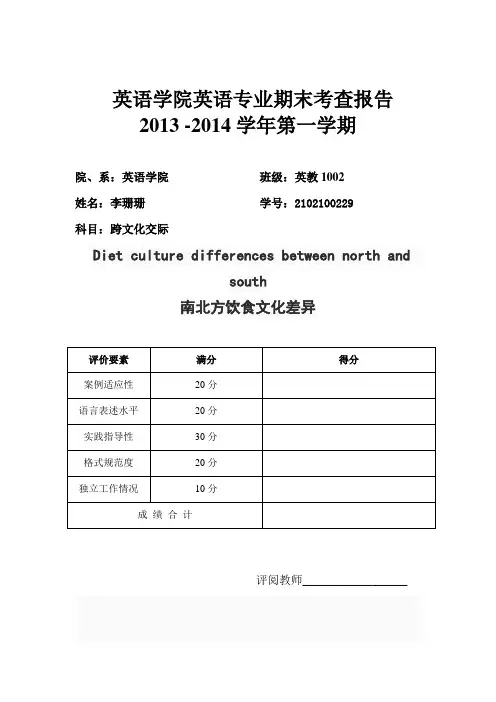
英语学院英语专业期末考查报告2013 -2014学年第一学期院、系:英语学院班级:英教1002姓名:李珊珊学号:2102100229科目:跨文化交际Diet culture differences between north andsouth南北方饮食文化差异评阅教师__________________Diet culture differences between north andsouthChina is bounded with the Yangtze river, the south north of the Yangtze river belong to the culture in the north, south of the Yangtze river belongs to the southern culture.The north-south diet differences. Because we have a lot of class students are from the south, so understanding of southerners had, both in life habits and diet culture differences, so try to understand these differences will be better and the south classmates to get along with, I think the concrete from the following several aspects to introduce the north-south differences, so more conducive to better learning in the future.The north and the south people living habits differencesSoutherners meters northerners eat noodles, because of the high rice yield southern moisture, dry north high yield of wheat.Southerners like to drink the northern people like drinking, because the north cold drink can keep out the cold.Southerners like cooking while northerners like big eat meat, because more abundant cuisine and the north south animal husbandry developed.1, to eat. The north is given priority to with pasta, southerners is given priority to with rice. Northerners like stew, southerners like delicate dishes. 2, wear. The north winter cotton-padded clothes to wear, the four seasons clothes are different, so the girl's wardrobe full; Southerners are not, like Kunming and other places, the four seasons clothes don't have to change. 3, to live in. Northerners live, pay attention to keep warm the cold south focuses on a cool, ventilated. 4, line. Northerners with land is given priority to, more southern waterways are clear.The most obvious is the language is different, different mouth will speak, the so-called "talked different dialects", however, the southerners and northerners dialogue should is a kind of humor. Northern people speak two roll badly, jabber, southerners, hard to avoid can't hear, southerners z, useful, and speak, ch, c, s, sh isalso like elongated end, to the north to listen to, sometimes a word can recognize several layers of meaning.South eight dialect, families, flowers. Even if the same dialect, there are a variety of accents. In some remote place, or some town, across dozens of or over a mountain, is a kind of accent is normal.Northerners don't like the south fragmented there are eight major dialect, the north is a dialect, both the northern dialect. He cover vast territories, range is wide, tone is also nice,. Especially in Beijing mandarin dialect as a template, clear pronunciation and mellow voice, tender and gentle, than the south hundred language well. Southerners speak like a small magpie in call, cheerful ringing, language and colorful scene that shows the southern culture diversity and rich, also accord with the characteristics of the southern delicate dexterity. Northerners to speak softly, not slow, gentle tone, just listen to the comfort, even call names, like singing, it has to do with the northern culture macro thick deep, low gas, spoke naturally have lasting appeal.In eating, north and south both sides each hold different opinions.1 · southerners delicious rice, northerners delicious noodles. Before the northern rice supply is limited, to the north of south China and the most can't stand is to eat noodles, a bowl of adequate weight can never taste the flavor, southerners have always is famous for fine to eat, also created a delicate stomach. A large bowl of ordinary face, how to say all feel it like a mountain, I'm afraid I have to do several meal to eat.2 the north also eat cold dishes, southerners are not accustomed to, don't think the health, eat not sick at MCE? Northerners just loving face, they think that eating rice luxury is not hungry, adequate weight, a surface to the top three meters, convenient northerners think cold dish eaten raw, and does not destroy nutrients.In general, the north diet, ruggedly adequate weight, while the south Seiko fine chisel, small and exquisite northern demand for food is not high, relative to lose to a good life in material from the south.From the point of food quantity, the southern most is small and exquisite. The north is more thick, rich vegetables all the year round, south in winter in the north is the most number of Chinese cabbage, or greenhouse vegetables, but relatively less. Especially in the countryside might be more big difference.Different from the soup, north and south: southerners drink soup is as a dish onthe table, is more of the hot weather drink soup in the summer,Guangzhou,drink soup before before eating, drinking, especially people in Guangzhou are notoriously fort soup. And the people of the north all year round to drink soup, but soup is after dinner drink, not as a general dish on the table, and mainly in the winter to drink soup, feel warm, warm.The north's bowl to drink, big stuttering vegetables, speak loudly. Southerners relatively fine. South meters north of the north and the south different eating habits. Southerners love rice, the north like pasta, it differs from the north and the south of the agricultural production structure. South China climate of high temperature and rainy, the cultivated land is given priority to with paddy field, so local farmers grow rice growth habit is fond of high temperature and rainy. And less precipitation in north China, the temperature is low, cultivated land for dry land, and more suitable for dry cold resistant wheat growth. The so-called "kind of what eat what", in the long term, then formed the eating habits in the north of the south rice.Southern students like to eat fish, but they still prefer seafood, seafood is good for health because it is over, northerners prefer to eat meat, seafood like no southerners, so love, so everybody's love in the seafood is not so strong. I think both the south and the north, and we also pay more attention to their health, life is good, so you better pursuit of the finer things in life.Analyses the differences in the south and the north, know after what to pay attention to, be aware that their preferences, it will be more conducive to good communication, as a northerner, learn to understand and tolerance of others, this will better cross-cultural.。
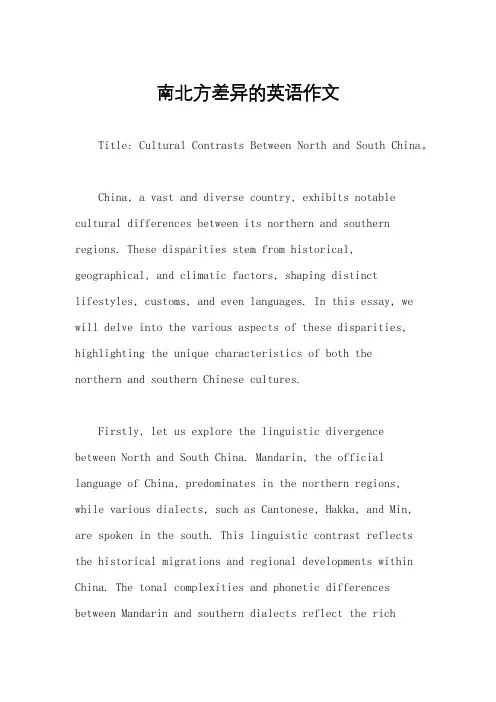
南北方差异的英语作文Title: Cultural Contrasts Between North and South China。
China, a vast and diverse country, exhibits notable cultural differences between its northern and southern regions. These disparities stem from historical, geographical, and climatic factors, shaping distinct lifestyles, customs, and even languages. In this essay, we will delve into the various aspects of these disparities, highlighting the unique characteristics of both thenorthern and southern Chinese cultures.Firstly, let us explore the linguistic divergence between North and South China. Mandarin, the official language of China, predominates in the northern regions, while various dialects, such as Cantonese, Hakka, and Min, are spoken in the south. This linguistic contrast reflects the historical migrations and regional developments within China. The tonal complexities and phonetic differences between Mandarin and southern dialects reflect the richlinguistic tapestry of the nation.Cuisine also serves as a prominent point of differentiation. Northern cuisine, characterized by hearty, wheat-based dishes, showcases influences from neighboring regions like Mongolia and Russia. Dumplings, noodles, and steamed bread are staples in northern diets. In contrast, southern cuisine features rice as a staple, accompanied by a myriad of flavors and cooking techniques. Cantonese cuisine, renowned for its dim sum and seafood dishes, exemplifies the diversity and subtlety of southern cooking.Furthermore, climate plays a pivotal role in shaping cultural practices. Northern China experiences harsh winters and hot, dry summers, necessitating heavy clothing and heating during the colder months. In contrast, the subtropical climate of the south fosters lush vegetation and mild winters, influencing agricultural practices and dietary preferences. Festivals like the Lunar New Year are celebrated with distinct customs and traditions in both regions, reflecting their unique cultural identities.Social customs and values also vary between North and South China. Northern communities often prioritize collectivism and familial piety, emphasizing the importance of hierarchical relationships and social harmony. In contrast, southern societies tend to be more individualistic, with greater emphasis on personal success and entrepreneurial spirit. These cultural nuances influence social interactions, business practices, and even educational systems within each region.Moreover, architecture and urban planning showcase contrasting aesthetics and historical influences. Northern cities like Beijing boast grand imperial palaces and traditional courtyard houses, reflecting centuries of dynastic rule and Confucian values. In contrast, southern cities like Shanghai blend colonial-era architecture with modern skyscrapers, symbolizing China's rapid urbanization and globalization in recent decades.In conclusion, the cultural disparities between North and South China are multifaceted and deeply rooted in history, geography, and social dynamics. While both regionsshare a common Chinese identity, their distinct languages, cuisines, customs, and values contribute to the rich tapestry of Chinese culture. Embracing and understanding these differences not only fosters mutual respect and appreciation but also enriches our collective understanding of China's cultural heritage.。
The Divergent ulinary Traditions of Northand South hinaChina, a land rich in cultural diversity, boasts a vast array of culinary traditions that vary significantly from north to south. These differences, often reflecting the diverse geographical, climatic, and historical backgrounds of the regions, manifest in the unique flavors, cooking techniques, and ingredients used in the local cuisines.In the north, the cuisine is typically known for its hearty and robust flavors. Influenced by the colder climate and the abundance of wheat-based crops, northern dishes often feature wheat-based foods like noodles, dumplings, and breads. These dishes are often served with robust sauces and meats that are cooked through stewing, braising, or frying techniques. The use of heavy flavors and condiments, such as soy sauce and chili peppers, adds depth and warmth to the dishes, making them particularly suitable for the colder seasons.Contrastingly, the cuisine of the south is renowned for its delicate and refined flavors. The warmer climate and the abundance of rice cultivation in the south have led toa heavy reliance on rice-based dishes. From steamed rice to rice noodles and porridge, rice forms the staple of many southern meals. Moreover, the southern cuisine emphasizes the freshness and natural flavors of its ingredients, often featuring seafood, vegetables, and poultry that are lightly cooked to preserve their original flavors and textures. The use of fragrant herbs and spices, such as ginger, garlic, and cilantro, adds a distinct aroma and taste to southern dishes.In addition to these fundamental differences, the north and south also vary in their preferences for certainflavors and ingredients. For instance, while the north tends to favor salty and spicy flavors, the south often prefers sweet and sour notes. This difference is reflected in the use of condiments and seasonings, as well as in the types of dishes that are popular in each region.Moreover, the drinking culture also differssignificantly between the north and south. In the north, alcohol consumption is generally more prevalent, with beer and baijiu being popular choices. These drinks often accompany hearty meals and social gatherings. On the otherhand, the south tends to favor tea and other non-alcoholic beverages, reflecting a more relaxed and refined dining culture.The diverse culinary traditions of north and south China are not only a testament to the rich cultural heritage of the country but also a source of endless culinary exploration for food lovers. From the hearty and robust flavors of the north to the delicate and refined tastes of the south, each region offers a unique culinary experience that is worth trying.中国南北饮食文化差异中国,一个文化多元、地域辽阔的国家,其饮食文化南北差异显著。
南北方差异英语作文Title: Contrasting Cultural Dynamics: The North-South Divide in China。
China, a vast and diverse country, exhibits asignificant regional contrast between the northern and southern regions, which extends beyond just geographical disparities. This contrast is palpable in various aspectsof life, including language, cuisine, climate, and social norms. Exploring these differences sheds light on the rich tapestry of Chinese culture.First and foremost, one of the most noticeable distinctions between the North and South lies in their respective dialects. Mandarin, the standard Chinese dialect, is predominantly spoken in the North, while variousdialects such as Cantonese, Hakka, and Min are prevalent in the South. This linguistic diversity reflects historical migrations, cultural influences, and geographical isolation. Consequently, communication can sometimes pose a challengefor individuals from different regions, highlighting the linguistic richness of China.Cuisine serves as another significant marker of regional disparity. Northern cuisine is characterized by hearty and wheat-based dishes, such as dumplings, noodles, and steamed buns. In contrast, southern cuisine tends to favor rice as a staple, accompanied by a wide array of flavorful dishes, including stir-fries, soups, and seafood delicacies. The variation in ingredients and cooking techniques reflects not only geographical differences in agricultural practices but also distinct culinarytraditions passed down through generations.Moreover, climate plays a pivotal role in shaping the cultural landscape of the North and South. Northern China experiences four distinct seasons, with cold winters and hot summers, whereas the South enjoys a subtropical climate characterized by milder winters and humid summers. These climatic disparities influence everything from clothing preferences and architectural styles to agricultural practices and recreational activities, contributing to theunique identities of each region.Social norms and customs also differ significantly between the North and South. In the North, there is often a greater emphasis on hierarchy, formalities, and collectivism, whereas the South tends to be more relaxed, egalitarian, and individualistic. These cultural norms manifest in various aspects of daily life, including communication styles, family structures, and societal expectations. For instance, traditional northern families may adhere more strictly to filial piety and ancestral worship, while southern families may prioritize personal freedom and entrepreneurship.Despite these differences, it is essential to recognize that the North and South share a common cultural heritage rooted in thousands of years of history and civilization. Both regions have made invaluable contributions to Chinese literature, philosophy, art, and technology, enriching the tapestry of Chinese culture as a whole. Furthermore, increased mobility, urbanization, and communication have facilitated greater cultural exchange and convergencebetween the North and South in recent decades, blurring the boundaries of regional identity.In conclusion, the North-South contrast in China encompasses a myriad of cultural dynamics, ranging from language and cuisine to climate and social norms. While these differences highlight the rich diversity within Chinese society, they also underscore the complexities of identity and belonging in a rapidly changing world. Embracing these regional disparities with curiosity and respect fosters a deeper understanding of Chinese culture and strengthens the bonds that unite people across geographical divides.。
中国南北方文化差异英语作文The Cultural Diversity between Northern and Southern ChinaChina is a vast and diverse country, with a rich cultural heritage that has evolved over thousands of years. One of the most striking features of Chinese culture is the distinct differences between the northern and southern regions. These differences have been shaped by a variety of factors, including geography, climate, and historical developments.One of the most obvious differences between northern and southern China is the cuisine. Northern Chinese cuisine is often characterized by hearty, starchy dishes, such as dumplings, noodles, and breads. These foods are well-suited to the colder, drier climate of the north, where the winters can be long and harsh. In contrast, southern Chinese cuisine is known for its use of rice, seafood, and a variety of fresh vegetables. The warmer, more humid climate of the south allows for a greater diversity of agricultural products, which are then incorporated into the local cuisine.Another key difference between the two regions is the language. While Mandarin Chinese is the official language of China and isspoken throughout the country, there are significant regional variations in dialects and accents. Northern Chinese dialects, such as Beijing Mandarin, are often described as more guttural and harsh-sounding, while southern Chinese dialects, such as Cantonese, are often considered to be more melodic and lyrical.These linguistic differences are not just superficial; they also reflect deeper cultural and historical divisions. Northern China has long been the political and cultural center of the country, with the capital cities of Beijing and Xi'an serving as the seats of power for many dynasties. As a result, the northern Chinese dialect has been heavily influenced by the language of the ruling elite, and has come to be seen as the "standard" form of Chinese.In contrast, southern China has historically been more isolated from the political and cultural centers of the country. The southern provinces, such as Guangdong and Fujian, have developed their own unique cultural traditions and dialects, which have been shaped by their proximity to the ocean and their interactions with other Asian cultures.These regional differences are also reflected in the architecture and art of the two regions. Northern Chinese architecture is often characterized by grand, imposing structures, such as the Forbidden City in Beijing or the Great Wall of China. These buildings aredesigned to convey a sense of power and authority, and are often decorated with elaborate carvings and ornaments.In contrast, southern Chinese architecture is often more understated and organic, with a focus on blending seamlessly with the natural environment. The traditional houses of southern China, known as "tulou," are circular earthen structures that are designed to provide shelter and community while minimizing the impact on the surrounding landscape.Similarly, the art of northern and southern China has developed along distinct trajectories. Northern Chinese art is often characterized by a focus on realism and attention to detail, as exemplified by the intricate brush paintings of the Song dynasty. In contrast, southern Chinese art is often more abstract and expressive, with a emphasis on the natural world and the emotional experience of the viewer.These cultural differences between northern and southern China have also shaped the social and political dynamics of the country. The northern regions have historically been the center of political power, and have often been seen as more conservative and traditional. In contrast, the southern regions have been more open to outside influences and have been more willing to embrace change and innovation.This dynamic has played out in various ways throughout Chinese history, from the conflicts between the northern and southern dynasties during the period of division, to the ongoing tensions between the central government and the more autonomous southern provinces.Despite these differences, however, there is a deep sense of shared identity and pride among all Chinese people. The cultural diversity of China is seen as a source of strength and richness, rather than a source of division. As China continues to evolve and modernize, it will be interesting to see how these regional differences continue to shape the country's cultural and political landscape.In conclusion, the cultural differences between northern and southern China are a testament to the richness and complexity of Chinese civilization. From cuisine and language to architecture and art, these regional variations reflect the deep historical and geographical roots of the Chinese people. As China continues to grow and change, it will be important to celebrate and preserve this cultural diversity, while also finding ways to bridge the gaps between the different regions and create a more unified and harmonious national identity.。
China is a country with a long history and vast area. So China has a rich cultural background but the cultural difference is very big also, especially cultural differences between the north and the south in the traditional society.Differences between the north and the south under the traditional social mainly has the following points.First of all, the north-south diet and taste differences mainly displays in the south of the staple food is rice, taste sweet.However,the northern staple food is noodles, taste salty. Secondly, the language differences between north and south is the southern language multifarious, the northern language is uniform.Thirdly, the south is a major spread to laozi philosophy,however the north is the birthplace of Confucius Confucianism.Fourthly, the north and the south people living habits is different, to some extent that represents the north-south differences in regional culture: southern delicate, exquisite, but northerners bold, simple; Southerners speak more tactfully, northern people speak more directly.Fifthly, different natural geographical environment lead to different modes of transportation: the south water traffic developed, north mainly by land transportation.However, with the development of social economy, cultural difference between the south and the north has decreased.First of all, the north and the south's eating habits have changed.Because of the spread of food culture, some people in the north fell in love with the southern food, Southerners no longer excluded Pasta.Secondly, under the modern society,the main traffic tools of the north and the south are cars, trains and airplanes.The faster transportation contributed to the north and the south trade and communication.At the same time also promoted the flow of the population and cultural integration.In addition, a single culture are easy to be isolated and destroyed, so in order to stabilize society, countries will take various measures in the case of reserve national characteristics, promoting the unity of the nation.。
英语学院英语专业期末考查报告2013 -2014学年第一学期院、系:英语学院班级:英教1002姓名:李珊珊学号:2102100229科目:跨文化交际Diet culture differences between north andsouth南北方饮食文化差异评阅教师__________________Diet culture differences between north andsouthChina is bounded with the Yangtze river, the south north of the Yangtze river belong to the culture in the north, south of the Yangtze river belongs to the southern culture.The north-south diet differences. Because we have a lot of class students are from the south, so understanding of southerners had, both in life habits and diet culture differences, so try to understand these differences will be better and the south classmates to get along with, I think the concrete from the following several aspects to introduce the north-south differences, so more conducive to better learning in the future.The north and the south people living habits differencesSoutherners meters northerners eat noodles, because of the high rice yield southern moisture, dry north high yield of wheat.Southerners like to drink the northern people like drinking, because the north cold drink can keep out the cold.Southerners like cooking while northerners like big eat meat, because more abundant cuisine and the north south animal husbandry developed.1, to eat. The north is given priority to with pasta, southerners is given priority to with rice. Northerners like stew, southerners like delicate dishes. 2, wear. The north winter cotton-padded clothes to wear, the four seasons clothes are different, so the girl's wardrobe full; Southerners are not, like Kunming and other places, the four seasons clothes don't have to change. 3, to live in. Northerners live, pay attention to keep warm the cold south focuses on a cool, ventilated. 4, line. Northerners with land is given priority to, more southern waterways are clear.The most obvious is the language is different, different mouth will speak, the so-called "talked different dialects", however, the southerners and northerners dialogue should is a kind of humor. Northern people speak two roll badly, jabber, southerners, hard to avoid can't hear, southerners z, useful, and speak, ch, c, s, sh isalso like elongated end, to the north to listen to, sometimes a word can recognize several layers of meaning.South eight dialect, families, flowers. Even if the same dialect, there are a variety of accents. In some remote place, or some town, across dozens of or over a mountain, is a kind of accent is normal.Northerners don't like the south fragmented there are eight major dialect, the north is a dialect, both the northern dialect. He cover vast territories, range is wide, tone is also nice,. Especially in Beijing mandarin dialect as a template, clear pronunciation and mellow voice, tender and gentle, than the south hundred language well. Southerners speak like a small magpie in call, cheerful ringing, language and colorful scene that shows the southern culture diversity and rich, also accord with the characteristics of the southern delicate dexterity. Northerners to speak softly, not slow, gentle tone, just listen to the comfort, even call names, like singing, it has to do with the northern culture macro thick deep, low gas, spoke naturally have lasting appeal.In eating, north and south both sides each hold different opinions.1 · southerners delicious rice, northerners delicious noodles. Before the northern rice supply is limited, to the north of south China and the most can't stand is to eat noodles, a bowl of adequate weight can never taste the flavor, southerners have always is famous for fine to eat, also created a delicate stomach. A large bowl of ordinary face, how to say all feel it like a mountain, I'm afraid I have to do several meal to eat.2 the north also eat cold dishes, southerners are not accustomed to, don't think the health, eat not sick at MCE? Northerners just loving face, they think that eating rice luxury is not hungry, adequate weight, a surface to the top three meters, convenient northerners think cold dish eaten raw, and does not destroy nutrients.In general, the north diet, ruggedly adequate weight, while the south Seiko fine chisel, small and exquisite northern demand for food is not high, relative to lose to a good life in material from the south.From the point of food quantity, the southern most is small and exquisite. The north is more thick, rich vegetables all the year round, south in winter in the north is the most number of Chinese cabbage, or greenhouse vegetables, but relatively less. Especially in the countryside might be more big difference.Different from the soup, north and south: southerners drink soup is as a dish onthe table, is more of the hot weather drink soup in the summer,Guangzhou,drink soup before before eating, drinking, especially people in Guangzhou are notoriously fort soup. And the people of the north all year round to drink soup, but soup is after dinner drink, not as a general dish on the table, and mainly in the winter to drink soup, feel warm, warm.The north's bowl to drink, big stuttering vegetables, speak loudly. Southerners relatively fine. South meters north of the north and the south different eating habits. Southerners love rice, the north like pasta, it differs from the north and the south of the agricultural production structure. South China climate of high temperature and rainy, the cultivated land is given priority to with paddy field, so local farmers grow rice growth habit is fond of high temperature and rainy. And less precipitation in north China, the temperature is low, cultivated land for dry land, and more suitable for dry cold resistant wheat growth. The so-called "kind of what eat what", in the long term, then formed the eating habits in the north of the south rice.Southern students like to eat fish, but they still prefer seafood, seafood is good for health because it is over, northerners prefer to eat meat, seafood like no southerners, so love, so everybody's love in the seafood is not so strong. I think both the south and the north, and we also pay more attention to their health, life is good, so you better pursuit of the finer things in life.Analyses the differences in the south and the north, know after what to pay attention to, be aware that their preferences, it will be more conducive to good communication, as a northerner, learn to understand and tolerance of others, this will better cross-cultural.。